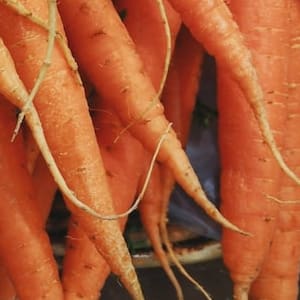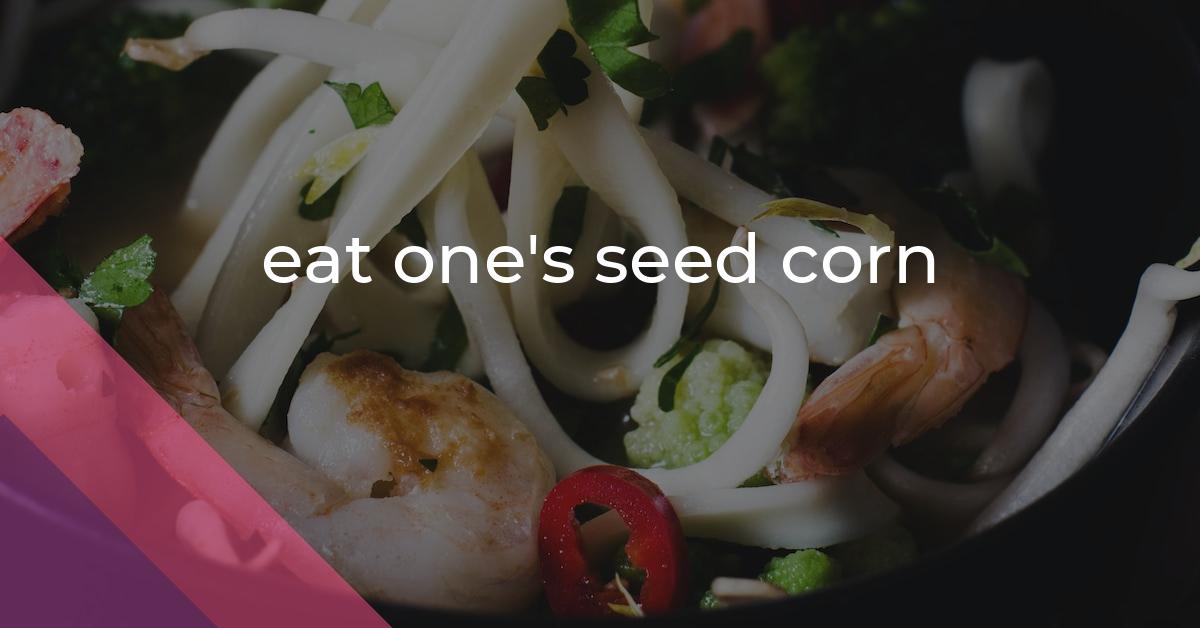eat one’s seed corn: Idiom Meaning and Origin
What does ‘eat one's seed corn’ mean?
In the idiom "eat one's seed corn", the phrase refers to consuming or disposing of valuable resources without considering the long-term consequences. It implies a short-sightedness and lack of foresight, often resulting in detrimental effects on future prospects or success.

Idiom Explorer
The idiom "kill the goose that lays the golden eggs" means to destroy a valuable source of income or opportunity by being greedy or short-sighted.
The idiom "have eyes bigger than one's stomach" means to take or desire more than one can actually consume or handle.
When someone or something "goes to seed," they become neglected, deteriorate, or decline in quality or appearance.
The idiom "for beans" means doing something with very little value or importance. It suggests that the action or result is not worth much, similar to the low value of beans as compared to more valuable substances.
The idiom "feather one's nest" means to accumulate wealth or resources for one's personal benefit, often through cunning or unethical means. It suggests the act of building a comfortable and secure home for oneself by adding more and more feathers to a nest, symbolizing wealth and comfort.
The idiom "eat the rich" figuratively means to criticize or oppose the wealthy and powerful members of society in order to achieve greater economic equality.
The idiom "eat one's own" means to act selfishly or prioritize one's own needs or interests above others, often to the detriment of others or the overall goal.
The idiom "eat one's head off" means to consume something excessively or without restraint, often referring to a person or an animal consuming food in large quantities. It emphasizes the idea of extreme or voracious eating.
Feasting on Future Harvest
Eat one's seed corn is an idiom that is commonly used in American English. The idiom is often used in a figurative sense to convey the idea of using up or depleting one's resources in a short-sighted manner, ultimately leading to negative consequences in the future.
The origin of the idiom can be traced back to agriculture. In early agricultural societies, farmers would carefully select and set aside the best quality seeds from their harvest to ensure a successful crop in the following year. This practice of setting aside the best seeds as 'seed corn' was crucial for sustaining agricultural productivity.
The idiom 'eat one's seed corn' seems to have its roots in the early 19th century, with the term 'seed corn' appearing in various writings and agricultural texts during that time. However, it was not until the late 19th and early 20th centuries that the idiom itself gained popularity.
The figurative meaning of 'eat one's seed corn' highlights the lack of foresight in consuming or squandering resources that are meant to be preserved for the future. By using or depleting one's seed corn, one is sacrificing future growth and sustainability for immediate gains.
One possible interpretation of this idiom is in the context of economic decision-making. Just as a farmer who consumes his seed corn would face a future without crops to sustain him, an individual or organization that neglects to invest or save for the future may find themselves facing difficulties or ruin later on.
This idiom can also be applied to personal development and self-improvement. By neglecting to invest time, effort, or resources in acquiring new knowledge or skills, individuals risk stagnation and the inability to adapt to changing circumstances. 'Eating one's seed corn' refers to consuming or wasting one's potential for growth and improvement.
Similarly, the idiom 'eat one's young' carries a similar meaning. It refers to a situation where someone destroys or harms those who are dependent on them for support or care. Just as 'eating one's seed corn' sacrifices future growth, 'eating one's young' sacrifices the future potential and well-being of others.
Another related idiom is 'eat one's own'. This phrase is often used to describe a situation where someone harms themselves or works against their own interests. Just as 'eating one's seed corn' is a self-destructive act, 'eating one's own' has negative consequences for the individual involved.
Yet another related idiom is 'go to seed'. This phrase is used to describe a situation where something or someone deteriorates or declines in quality or appearance. Just as 'eating one's seed corn' leads to negative consequences in the future, 'going to seed' reflects a decline or deterioration over time.
Additionally, the idiom 'eat one's head off' can be compared to 'eating one's seed corn'. This phrase is often used to describe a situation where someone consumes excessively or indulges to a harmful extent. Just as 'eating one's seed corn' depletes resources that are meant to be preserved, 'eating one's head off' depletes one's personal well-being or resources.
Lastly, the idiom 'kill the goose that lays the golden eggs' relates to 'eating one's seed corn' as both reflect the idea of sacrificing future benefits for immediate gains. 'Killing the goose that lays the golden eggs' refers to a situation where someone destroys a valuable and sustainable source of income or benefit for the sake of short-term profit.
Overall, the idiom 'eat one's seed corn' serves as a cautionary reminder of the importance of foresight, planning, and preservation. It emphasizes the need to balance immediate desires or needs with long-term goals and sustainability. By understanding the origins and figurative meaning of this idiom, individuals can reflect on their own actions and decisions, ensuring that they are not inadvertently 'eating their seed corn' and compromising their future well-being.
Example usage
Examples of how the idiom eat one's seed corn can be used in a sentence:
- He spent all his savings on unnecessary luxuries and soon found himself eating his seed corn.
- The company decided to cut its research and development budget, but by doing so, they were essentially eating their seed corn.
- In order to meet current expenses, the farmer sold his fertile land, oblivious to the fact that he was eating his seed corn.
More "Agriculture" idioms



